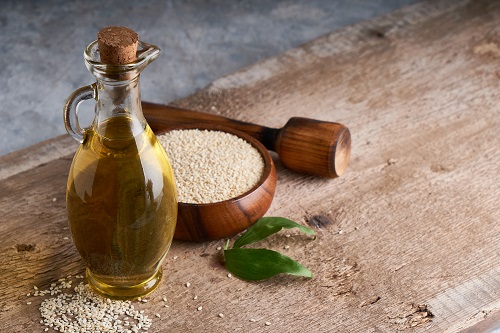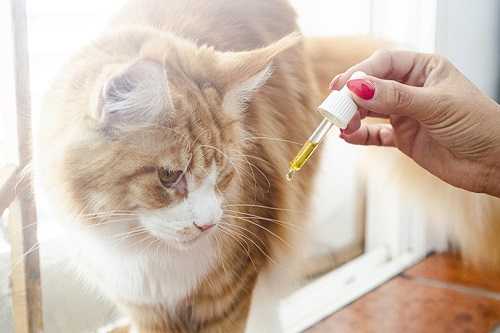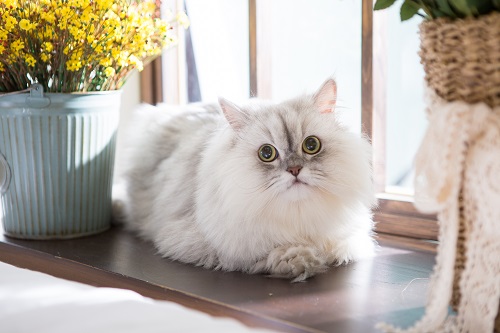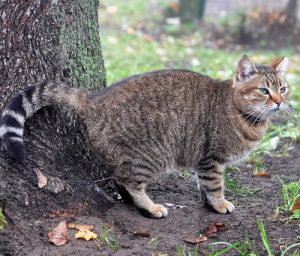Can Cats Have Sesame Oil? Scroll on to find out whether this oil is right for your feline companion or not.
Sesame oil is renowned for its culinary versatility and nutritional value, but can it be safely incorporated into your cat’s diet? Let’s find out Can Cats Have Sesame Oil below.
Can Cats Eat Coconut? Find out here
What is Sesame Oil?

Sesame oil is an aromatic cooking oil derived from sesame seeds. It has been used for centuries in various cuisines around the world, particularly in Asian cooking. This oil is extracted from sesame seeds through a process of pressing or grinding, resulting in a rich, golden-brown liquid with a distinct nutty flavor. Sesame oil is known for its versatility, lending a delightful taste and aroma to stir-fries, marinades, dressings, and other dishes. It is also used in traditional medicine and skincare due to its potential health benefits and moisturizing properties. With its unique profile and culinary charm, sesame oil adds a touch of exoticism to every dish it is added to and has become a staple ingredient in many kitchens.
Can Cats Have Sesame Oil?
Felines can have sesame oil, but it should be consumed in moderation and with caution. While small amounts of it can be safe for felines, it should not replace their regular diet of high-quality cat food. Additionally, some felines may have sensitive stomachs or allergies, so monitor their reaction to sesame oil and consult with a vet if any adverse symptoms occur. As with any new addition, it is recommended to introduce sesame oil gradually and in small quantities to ensure that the feline digestive system can handle it.
Is Sesame Oil Toxic To Cats?

Sesame oil is not toxic to cats. However, when consumed in significant amounts, sesame oil is harmful to felines’ overall well-being. If you don’t know which amount of sesame oil is right for your furry companion, read on to know more.
Is Sesame Oil Good For Cats?
Sesame oil is not necessarily good or essential for cats. While it’s not toxic, cats have specific dietary needs that are best met through a balanced cat food diet. Sesame oil does contain some beneficial nutrients, but they are typically obtained in sufficient amounts from their regular diet.
The Nutritional Needs of Cats
Cats have unique nutritional needs that must be met to ensure their overall health and well-being. As obligate carnivores, they require a diet that is rich in animal-based protein. High-quality cat food is best for them, providing essential amino acids, vitamins, and minerals. Cats also need a balanced ratio of fats and carbohydrates, with a focus on healthy fats for energy and a shiny coat. Ensuring that felines receive a well-balanced, species-appropriate diet is vital to their long-term health and vitality.
How Much Sesame Oil Is Safe For Cats?
If you wish to offer sesame oil to your cat, it should be done in moderation. Start with a very small amount, such as a few drops once every 2 -3 days, and observe your cat’s reaction. If there are no adverse effects, you can continue to offer it as an occasional treat or flavor enhancer. However, it should not exceed more than a small portion of their overall diet.
Does Sesame Oil Contain Any Nutritional Value For Cats?
- Fats: Sesame oil contains healthy fats, including polyunsaturated and monounsaturated fats, which contribute to overall health and support skin and coat conditions in cats.
- Vitamins and Minerals: Sesame oil may provide small amounts of vitamins and minerals, including vitamin E, which acts as an antioxidant and helps protect cells from damage.
Benefits of Feeding Sesame Oil To Cats
- Skin and Coat Health: Sesame oil contains healthy fats, such as omega-6 fatty acids, which are essential for maintaining healthy skin and a glossy coat in cats.
- Moisturizing Properties: When applied topically, sesame oil moisturizes dry and flaky skin in felines, providing relief from itchiness and improving overall skin condition.
- Palatability and Flavor Enhancement: Some cats may find the nutty flavor of sesame oil appealing, making it a useful addition to their food to enhance taste and encourage consumption.
How To Feed Sesame Oil To Cats?
- Start Small: Begin by introducing a small amount of sesame oil to your cat’s diet.
- Mix: Mix some quantity of sesame oil with your cat’s regular food. Start with just a few drops and gradually increase the amount if it suits your pet.
- Flavor Enhancer: Another approach is to drizzle a small amount of sesame oil over your cat’s food as a flavor enhancer. This works especially well with pets who are picky eaters, as the strong aroma of the oil attracts them.
- Monitor: Pay close attention to how your kitty reacts after consuming sesame oil. Look for any signs of digestive upset, allergies, or adverse reactions. If any negative symptoms occur, discontinue the use of sesame oil and consult with a veterinarian.
Risks of Feeding Sesame Oil To Cats
- High Fat Content: Sesame oil is high in fat, and overconsumption can lead to weight gain and obesity-related health issues in felines.
- Allergic Reactions: Some cats may have allergies or sensitivities to sesame oil, which can cause skin irritations and itching.
- Digestive Issues: Excessive consumption of sesame oil can lead to digestive upset in cats.
- Nutritional Imbalance: Feeding too much sesame oil can disrupt the balance of essential nutrients in a cat’s diet, potentially leading to deficiencies or imbalances.
Can Cats Have Sesame Seeds?
Just like sesame oil, sesame seeds are also safe for cats in small quantities. While feeding them to felines, it is important to take precautions – offer them in small, ground, or crushed form to avoid choking hazards and monitor your pet’s reaction.
Can Cats Have Sesame Oil? Quick Takeaways!

- Sesame oil is derived from sesame seeds and has a distinct nutty flavor.
- Felines can consume sesame oil in moderation, but it should not replace their regular cat food diet.
- Some felines may have sensitivities or allergies to sesame oil, so monitoring their reaction is important.
- Cats require a species-appropriate diet that is rich in animal-based protein, balanced in fats and carbohydrates, and supplemented with essential nutrients to support their overall health and well-being.
- Sesame oil does contain beneficial nutrients such as healthy fats (polyunsaturated and monounsaturated fats), vitamins, and minerals.
- Feeding sesame oil to felines should be done gradually and in small quantities while monitoring their reaction.
- Sesame oil can contribute to skin and coat health, provide moisturizing properties, and enhance palatability and flavor in cats.
- When feeding sesame oil to kitties, start with a small amount mixed with their food or as a flavor enhancer.
- Risks of feeding sesame oil to felines include high-fat content, potential allergic reactions, digestive issues, and nutritional imbalances.
- Sesame seeds can be given to felines in small quantities, but precautions should be taken to avoid choking hazards.
- Consult with a veterinarian before introducing sesame oil to your kitty’s diet to ensure it aligns with their specific needs.



